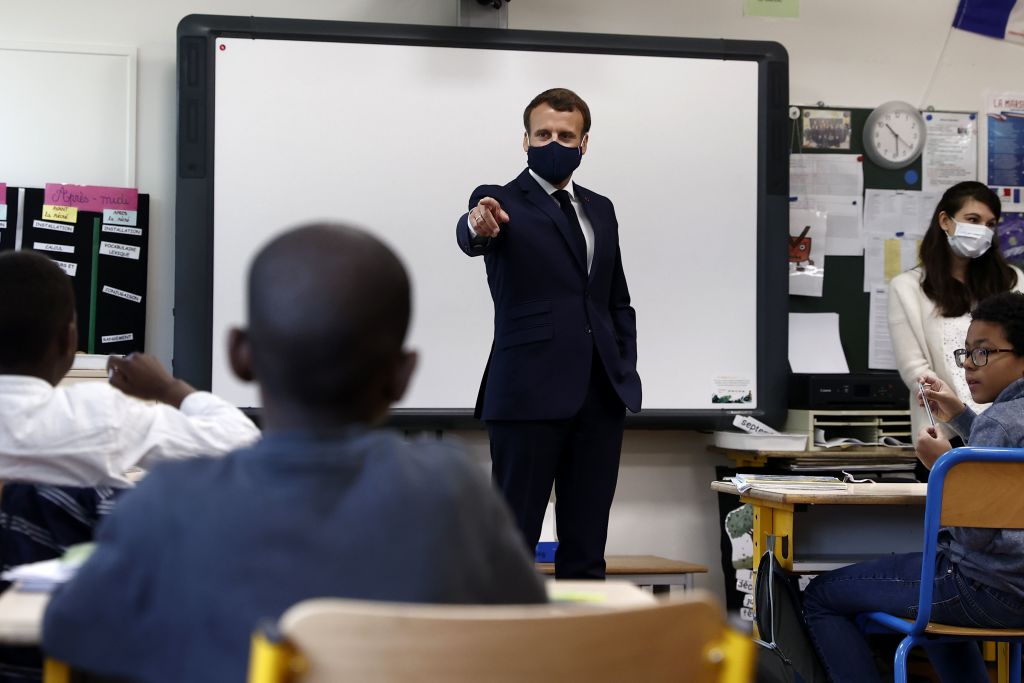If there is a God, He’s not French. Last night I was on the balcony of my apartment in Paris enjoying a celebratory ‘deconfinement’ bottle of wine; this morning on my first day of (partial) liberty there is heavy rain and high wind. So much for getting out and about on day one of post-lockdown life in France.
Not that it will be that easy even when the weather does stop misbehaving. Paris is in the ‘red zone’, one of four regions of France that still has many restrictions in place, affecting 27 million people.
In the ‘green’ zone, effectively the west and south of the country, parks are open, primary and secondary schools and shops are reopening and some beaches are also accessible.
In Paris, however, while most shops will reopen the parks remain closed, as do secondary schools. One will require a permit from their employer to travel on public transport in the rush hour otherwise they face a £120 (€135) fine. There will be also be a similar punishment for anyone riding the train, metro or bus without a face mask.
Restaurants, bars, theatres and cinemas will remain closed in both zones, until at least the start of June, and regardless of where you live in the country there is no travelling further than 100km (65 miles) from home except for work or a family emergency.
That rather limits the getaway options for Parisians. No weekend break to the seaside or the mountains, no jaunt to a city of culture such as Reims or Rouen; even Emmanuel Macron’s home town of Amiens is just out of reach. On the other hand, my daughter and I are planning to a trip to Rambouillet at the weekend; the château will be closed, so too the town’s bistros, but not the forest, which as of today is open to ramblers. What a joy it will be to move among trees and sit on the grass with the sun on one’s face.
Millions of French people have been deprived of such simple pleasures since 17 March and the question is how will they behave in the ‘deconfinement’. A prominent member of the Yellow Vest movement has warned that street protests are brewing and there are demonstrations planned this Saturday in a number of cities. A recent opinion poll revealed that 66 per cent of those questioned in France are disappointed in the way in which their government has handled the crisis, a higher percentage than the other European countries canvassed.
The strongest criticisms concern a lack of support for medical staff and a shortage of masks, while 74 per cent of those surveyed believe that the government didn’t take ‘the right decisions at the right moments’.
Governments throughout the West will face similar recriminations in the weeks and months to come but it is France where the people are likely to most forcibly vent their dissatisfaction, particularly if the dire economic forecasts come to pass.
It’s lucky for Macron that the broadcast and print media has in general been supportive. There have been criticisms aired about the lack of testing and PPE but none of the incessant sniping that has characterised the coverage in Britain.
Furthermore, the emphasis in the French media has been factual and not emotional. The names of the dead are rarely publicised – certainly not their back stories – and the mawkishness that defines so much of the British press these days is absent.
Overall, there’s a greater maturity in the way that the French press have covered the crisis and that’s reflected in the behaviour of the people and politicians. There have been no actresses in France appearing on TV wishing that president Macron was dead and nor do you find nurses, paramedics and police officers in France uploading videos of themselves dancing on social media. Unlike the British, the French haven’t this need to do so.
Nor is the government in thrall to football. President Macron is a fan of the sport but he’s terminated the season on the advice of his medical advisors. There were howls of protest from a couple of wealthy club owners unused to not calling the shots, but it was a bold and correct decision that showed who was in charge.
In Britain, in contrast, it’s never been that clear who’s calling the shots. France is temporarily divided into red and green zones, but that’s better than being the grey zone that Britain has become.







Comments